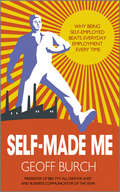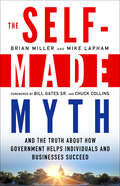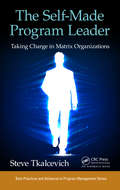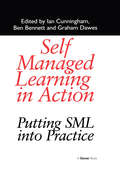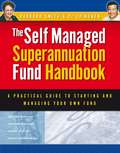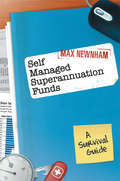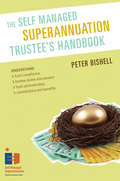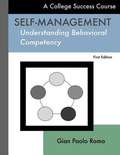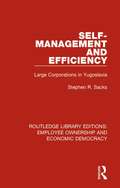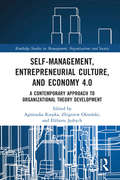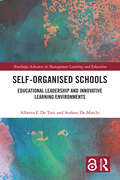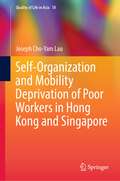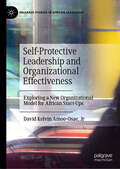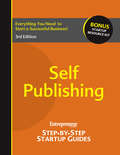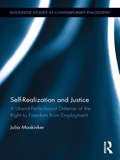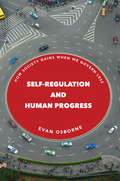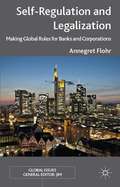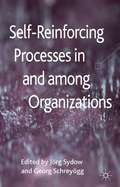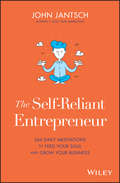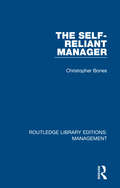- Table View
- List View
Self-Made Me
by Geoff BurchStop working for the man - break free and make sure you're getting paid what you're worth Stop slogging away 9 - 5 for a set salary (plus the overtime you inevitably do and don't get any credit for). Abandon the day job and go it alone. Start doing what you want to do, when you want to do it. There are currently 4 million self-employed people in the UK -be one of them, join them, set yourself free. It's not about becoming an entrepreneurial whiz-kid, it's about working the way you want to work, on the things you want to work on, and in the location you want to do it from. Remember, you don't have to sit in an office to get a job done. Self-Made Me shows you how to work how and where you want and earn exactly what you're worth - not what an employer wants to get away with giving you. Be your own boss and increase your value. It's never been easier to be self-employed than it is today, with increased communications, mobile working and outsourcing This straight-forward and engaging guide will help you make being self-employed a success Shows you how to get paid what you are actually worth, and how to work as hard or as little required to create the lifestyle you choose Self Made Me is for a new breed of people, and will show you how to make self-employment work for you.
The Self-Made Myth: And the Truth about How Government Helps Individuals and Businesses Succeed
by Brian Miller Mike Lapham&“Powerful, compelling, and well researched . . . demolishes what may be the most destructive myth in America.&” —David Korten, author of Agenda for a New Economy The Self-Made Myth exposes the false claim that business success is the result of heroic individual effort with little or no outside help. Brian Miller and Mike Lapham not only bust the myth; they present profiles of business leaders who recognize the public investments and supports that made their success possible—including Warren Buffett, Ben Cohen of Ben and Jerry&’s, New Belgium Brewing CEO Kim Jordan, and others. The book also thoroughly demolishes the claims of supposedly self-made individuals such as Donald Trump and Ross Perot. How we view the creation of wealth and individual success is critical because it shapes our choices on taxes, regulation, public investments in schools and infrastructure, CEO pay, and more. It takes a village to raise a business—and it&’s time to recognize that fact.
The Self-Made Program Leader: Taking Charge in Matrix Organizations (Best Practices in Portfolio, Program, and Project Management #21)
by Steve TkalcevichAlmost all leadership books assume that the leader has authority over their team members. The challenge of project management in a matrix-structured environment is that this is not always the case. A whole new plan of attack has to be executed for the project manager to deliver in an organization where they do not have formal authority. This book t
Self Managed Learning in Action: Putting SML into Practice
by Ian Cunningham Ben BennettOver the last two decades the importance of Self Managed Learning (SML) has become increasingly recognized. This book shows how it has revolutionized learning in organizations such as Ericsson, PPP Healthcare and Sainsbury’s, and how it has contributed to wider organizational change. The book consists of four Parts. Part I places SML against the backdrop of changing global trends and the organizational responses to them. It examines how these have led to the need for people to be more self managing and provides an overview of an SML programme. Part II shows SML programmes in action by presenting case studies from nine very different organizations which have used this approach. Part III looks at SML methods in more depth by concentrating on strategic learning contracts, learning groups and how SML can be supported. Finally, Part IV concludes and looks to the future. Rigorously researched, Self Managed Learning in Action demonstrates that this important approach can be used in a wide variety of contexts and cultures, in the private sector and in the public sector, and for a wide range of staff.
Self Managed Superannuation Fund Handbook: A Practical Guide to Starting and Managing Your Own Fund
by Barbara SmithIn The Self Managed Superannuation Fund Handbook, tax and superannuation specialists Barbara Smith and Dr Ed Koken show you how to take advantage of the simplified do-it-yourself superannuation and pension rules, and how to get the best out of your investments in the most tax-friendly way. This practical handbook covers: why you should set up and run your own fund investment options and strategies taxation tips and traps in running your fund accessing your retirement savings as pension This book is full of information for investors setting up or already running an SMSF, and professionals who provide superannuation and retirement planning advice to clients with SMSFs.
Self Managed Superannuation Funds: A Survival Guide
by Max NewnhamRE: Self Managed Superannuation Funds: A Survival Guide Self managed superannuation funds (SMSFs) are the fastestgrowing sector of the superannuation industry. It’s no wonder, given the almost unlimited investment options available with SMSFs — including investing in property, unlisted managed funds and collectables. So, is it time you joined the increasing number of Australians taking control of their fi nancial future with an SMSF? Self Managed Superannuation Funds: A Survival Guide will help you manage one of the most important fi nancial assets you’ll ever own. Topics covered include: determining if an SMSF is for you selecting your own investments setting up your super fund managing the paperwork understanding trustees’ duties complying with legislation implementing tax-saving strategies.
The Self Managed Superannuation Trustee's Handbook
by Peter BishellThere are more than 700,000 self managed superannuation trustees in 360,000 Australian funds with in excess of $300 billion under management. The Self Managed Superannuation Trustee's Handbook will assist trustees to understand their role and comply with their legal obligations. Covering topics such as fund compliance, trustee duties and powers, fund administration, contributions and benefits, investment of funds and the sole purpose test, The Self Managed Superannuation Trustee's Handbook is an essential education tool for both active and passive trustees. Self managed superannuation fund trustees are consistently being informed by the regulator (the ATO) that they must gain a proper understanding of their roles and responsibilities as trustees. When the ATO ran nationwide courses covering the basics they could not cope with the demand. Most SMSF trustees want to comply with the law and are willing to educate themselves to ensure that they do. Their problem has been that there are only a very limited number of professional advisers who understand all the relevant issues and accessing their services can be very expensive. Furthermore, trustees of SMSFs get frustrated by the continual contradictions in reports concerning their obligations contained in the financial press. As operators of SMSFs, they are large consumers of self-help materials regarding superannuation and related topics. SMSF trustees need one informed, authoritative book that sets out their roles and responsibilities in terms of the law, their relationship with the regulator and helps them to assess the truth or otherwise of statements they hear from other sources. The Self Managed Superannuation Trustee's Handbook provides all the information trustees require.
Self-management: Understanding Behavioral Competency
by Gian RomaEach year millions of very smart students drop out of high school and college for non-financial reasons. It is a troubling problem that highlights the need for students to be more resilient, prepared, and effective at reaching their goals. How can students position themselves to succeed in this increasingly demanding, changing, and competitive world? One way is to learn and practice the basic behaviors necessary to achieve goals. "Self-Management: Understanding Behavioral Competency" offers an innovative approach to help students achieve their goals by clarifying the behaviors that foster success. Behaviors communicate a great deal. Because certain behaviors lead to better academic performance than others, it is essential for students to learn about the relationship between behavior and academic performance. This "self-study" book introduces a comprehensive self-management model to help students understand their own behavioral decision-making. With this model, the author shows students how their own behavior can affect not only their academic future, but also life after graduation. The book provides a practical framework, "how to" exercises, and self-tests for individuals, families, and schools seeking to establish, assess, or improve behavioral performance. College and high school faculty that teach student development, management, and student success courses should not be without this invaluable training resource.
Self-Management and Efficiency: Large Corporations in Yugoslavia (Routledge Library Editions: Employee Ownership and Economic Democracy #12)
by Stephen R. SacksThe book, first published in 1983, examined whether the Yugoslavs’ extensive implementation of their principle of self-management by small work units was costly in terms of economic efficiency. Were they atomizing their firms into inefficiently small fragments? Was the system of worker self-management appropriate only for small firms? Can a modern industrial enterprise of efficient scale, indeed very large scale, by run that way? In order to answer these questions, the author applies to large firms in former Yugoslavia the transactions cost analysis developed by the economist Oliver Williamson.
Self-Management, Entrepreneurial Culture, and Economy 4.0: A Contemporary Approach to Organizational Theory Development (Routledge Studies in Management, Organizations and Society)
by Agnieszka RzepkaThis book offers practical insight into the changing ways in which organizations operate today. Building on a groundbreaking concept of teal organizations, the book illustrates the practicality of advocating a lack of hierarchy of predetermined positions and the introduction of roles that come with clear responsibilities constantly defined according to current needs. First described by Frederic Laloux, a teal organization is a ground-breaking approach to managing organizations that is being adopted around the world, which turns everyone into a leader. This new paradigm rests on the ideas of wholeness, evolutionary purpose, employee autonomy, and self-management based on peer relationships. Its main assumption is the empowerment of the employee resulting in a change in workplace relationships and a more soulful and purposeful work environment. Drawing on the authors’ research across six different countries, it presents the evolution of self-management and entrepreneurial culture in the current age of Economy 4.0 and examines how the teal concept has been implemented around the world. It examines misconceptions surrounding this novel approach and diagnoses the practical problems connected with implementing it in the current uncertain times. It will be of value to researchers, academics, managers, and students in the fields of management and organizational studies.
Self-Management, Entrepreneurial Culture, and Economy 4.0: A Contemporary Approach to Organizational Theory Development (Routledge Studies in Management, Organizations and Society)
by Agnieszka RzepkaThis book offers practical insight into the changing ways in which organizations operate today. Building on a groundbreaking concept of teal organizations, the book illustrates the practicality of advocating a lack of hierarchy of predetermined positions and the introduction of roles that come with clear responsibilities constantly defined according to current needs. First described by Frederic Laloux, a teal organization is a ground-breaking approach to managing organizations that is being adopted around the world, which turns everyone into a leader. This new paradigm rests on the ideas of wholeness, evolutionary purpose, employee autonomy, and self-management based on peer relationships. Its main assumption is the empowerment of the employee resulting in a change in workplace relationships and a more soulful and purposeful work environment.Drawing on the authors’ research across six different countries, it presents the evolution of self-management and entrepreneurial culture in the current age of Economy 4.0 and examines how the teal concept has been implemented around the world. It examines misconceptions surrounding this novel approach and diagnoses the practical problems connected with implementing it in the current uncertain times. It will be of value to researchers, academics, managers, and students in the fields of management and organizational studies.
Self-Organised Schools: Educational Leadership and Innovative Learning Environments (Routledge Advances in Management Learning and Education)
by Alberto F. De Toni Stefano De MarchiSelf-Organised Schools: Educational Leadership and Innovative Learning Environments describes the results of the research we carried out at fourteen Italian schools that highlight how there is a positive correlation between the capabilities of school self-organization and the innovativeness of learning environments: in other words, the more self-organized schools are, the more innovative learning environments are. The results of this work are part of the strand of research of bottom-up emergency and self-organization, an extremely fruitful trend as shown by Sugata Mitra, the founder of the Self-Organized Learning Environments, according to whom, "education is a self-organized system where learning is an emerging phenomenon". This book gives new insights on self-organization studies, and most of all, to the idea that change - organizational and educational innovation - sparks from the bottom. This book is aimed specifically at school principals of all levels, scholastic reformers, educational scholars, organisation and management consultants who want to innovate learning and management of learning. These actors will benefit drawing useful examples from more than thirty different learning environments worldwide, fourteen examples of schools that self-organize, two frameworks - and two ready-to-use questionnaires - measuring the innovativeness of a learning environment, and the capability of a school to self-organize. Self-organization is the most fascinating future of innovative principals
Self-Organization and Mobility Deprivation of Poor Workers in Hong Kong and Singapore (Quality of Life in Asia #18)
by Joseph Cho-Yam LauThis book focuses on the influence of socio-economic and land-use policies on the commuting problems and quality of life of the poor in Singapore and Hong Kong. It considers the influence of self-organisation: how the mobility of an individual is constituted by structures such as transport systems or socio-economic structural factors, as well as influenced by individual decisions. Where most transport studies focus on the influence of factors such as income inequality, the gender gap, and the built environment, this book fills a gap in paying particular attention to the influence of individual decisions on commuting. Given the prevalence of the former in research, government decision-makers are often constrained by these approaches and fail to understand the commuting problems of the poor. This book argues that the self-organisation approach provides some ideas that are outside the common conceptual framework in conventional transport planning and looks to improve mobility of lower-income commuters. Relevant to social science researchers working in areas such as urban planning and transport, mobility deprivation, and poverty, this book breaks new ground in quality of life studies in the Singapore and Hong Kong contexts.
Self-Organizing Federalism: Collaborative Mechanisms to Mitigate Institutional Collective Action Dilemmas
by Richard C. Feiock John T. ScholzThis book investigates the self-organizing responses of governments and interests to the institutional collective action (ICA) dilemmas of particular concern to students of federalism, urban governance, and regional management of natural resources. ICA dilemmas arise in fragmented systems whenever decisions by one independent formal authority do not consider costs or benefits imposed on others. The ICA framework analyzes networks, joint projects, partnerships, and other mechanisms developed by affected parties to mitigate ICA decision externalities. These mechanisms play a widespread but little-understood role in federalist systems by reshaping incentives in order to encourage coordination/cooperation. The empirical studies of urban service delivery and regional integration of regional resource management address three questions: How does a given mechanism mitigate costs of uncoordinated decisions? What incentives do potential members have to create the mechanism? How do incentives induced by the mitigating mechanism affect its sustainability in a changing environment and its adaptability to other ICA dilemmas?
Self-ownership, freedom, and equality
by G. A. CohenDefenders of capitalism claim that its inequality is the necessary price of the freedom that it guarantees. In that defense of capitalist inequality, freedom is self-ownership, the right of each person to do as he wishes with himself. The author shows that self-ownership fails to deliver the freedom it promises to secure. He thereby undermines the idea that lovers of freedom should embrace capitalism and the inequality that comes with it. In the final chapter he reaffirms the moral superiority of socialism, against the background of the disastrous Soviet experiment.
Self-Protective Leadership and Organizational Effectiveness: Exploring a New Organizational Model for African Start-Ups (Palgrave Studies in African Leadership)
by David Kelvin Amoo-Osae, JrThis book investigates and explores the impact of a self-protective leadership (SPL) style on the organizational effectiveness of start-up businesses within Africa, focusing on Ghana and Kenya. Self-protective leadership is defined as a leadership style that focuses on ensuring the safety and security of individuals and groups through status-enhancing and face-saving tactics. A typical self-protective leader can make decisions, and is free from political influences, but tends to be selfish, ritualistic, and self-centered. The author’s study, presented in this book, demonstrates a surprisingly high preference for SPL among Confucian Asian, Latin American, Middle Eastern, and Sub-Saharan African nations – all of which have a history of colonialism. If this is true, then SPL could be better suited to the business environment in Africa, but particularly amongst start-up enterprises. Examining this phenomenon, and using an explorative analysis of business and culture, the book investigates the extent to which the various dimensions or demonstrations of SPL impact organizational effectiveness in African start-up businesses. A valuable contribution to literature and research on African leadership styles, this is an ideal resource for students and researchers interested in leadership and organizational effectiveness within the African context.
Self Publishing
by Entrepreneur MagazineProfits from PagesSelf-publishing is a fast-growing industry, and bookstores and consumers alike now acknowledge the value of self-published books. In this valuable guide, industry experts coach you in becoming a player in the self-publishing arena-whether it is self-publishing your own book or providing professional services for others who want to self-publish.Our experts reveal the tricks of the self-publishing trade: how to evaluate book ideas and recognize a hot-seller; how to develop an effective marketing plan; getting books reviewed and landing great publicity; getting books into traditional and non-traditional sales channels; tapping into the potential of online publishing, and more.Addresses dramatic game-changers including print-on-demand and ebooksReviews industry player offerings including Ingram and AmazonCovers critical marketing tools including author websites and social media marketingFeatures interviews with industry insiders and practicing self-published authorsPlus, a quick-reference guide to every step in the publishing process helps you along your way.The First Three YearsIn addition to industry specific information, you'll also tap into Entrepreneur's more than 30 years of small business expertise via the 2nd section of the guide - Start Your Own Business. SYOB offers critical startup essentials and a current, comprehensive view of what it takes to survive the crucial first three years, giving your exactly what you need to survive and succeed. Plus, you'll get advice and insight from experts and practicing entrepreneurs, all offering common-sense approaches and solutions to a wide range of challenges. Pin point your target market Uncover creative financing for startup and growth Use online resources to streamline your business plan Learn the secrets of successful marketing Discover digital and social media tools and how to use them Take advantage of hundreds of resources Receive vital forms, worksheets and checklists From startup to retirement, millions of entrepreneurs and small business owners have trusted Entrepreneur to point them in the right direction. We'll teach you the secrets of the winners, and give you exactly what you need to lay the groundwork for success.BONUS: Entrepreneur's Startup Resource Kit!Every small business is unique. Therefore, it's essential to have tools that are customizable depending on your business's needs. That's why with Entrepreneur is also offering you access to our Startup Resource Kit. Get instant access to thousands of business letters, sales letters, sample documents and more - all at your fingertips!You'll find the following:The Small Business Legal ToolkitWhen your business dreams go from idea to reality, you're suddenly faced with laws and regulations governing nearly every move you make. Learn how to stay in compliance and protect your business from legal action. In this essential toolkit, you'll get answers to the "how do I get started?" questions every business owner faces along with a thorough understanding of the legal and tax requirements of your business.Sample Business Letters1000+ customizable business letters covering each type of written business communication you're likelyto encounter as you communicate with customers, suppliers, employees, and others. Plus a complete guide to business communication that covers every question you may have about developing your own business communication style.Sample Sales LettersThe experts at Entrepreneur have compiled more than 1000 of the most effective sales letters covering introductions, prospecting, setting up appointments, cover letters, proposal letters, the all-important follow-up letter and letters covering all aspects of sales operations to help you make the sale, generate new customers and huge profits.
Self-Realization and Justice: A Liberal-Perfectionist Defense of the Right to Freedom from Employment (Routledge Studies in Contemporary Philosophy)
by Julia MaskivkerIn this book, Maskivker argues that there ought to be a right not to participate in the paid economy in a new way; not by appealing to notions of fairness to competing conceptions of the good, but rather to a contentious (but defensible) normative ideal, namely, self-realization. In so doing, she joins a venerable tradition in ethical thought, initiated by Aristotle and developed in the work of important eighteenth and nineteenth century thinkers including Smith, Hume, and Marx.The book engages on-going debates (in both philosophical and real world political and social policy circles) about the provision of basic income grants, necessary to make the possibility of self-realization real for all. Traditional defenses of unconditional welfare benefits emphasize ideals of state neutrality when they claim that society should not discriminate against preferences for leisure in favor of preferences for work. According to these views, the state ought not to interfere with people’s choices about what constitutes the "good life." In contradistinction, Maskivker offers an innovative argument in defense of a particular ideal of the "good life," namely, life-goals directed at the pursuit of self-realization. However, her understanding of self-realization appeals to modern and contemporary values of freedom and pluralism. In a refreshingly new light, the book strikes a balance between fascinating debates on the conditions of human flourishing on the one hand, and heated discussions about the Welfare State on the other.
Self-Regulation and Human Progress: How Society Gains When We Govern Less
by Evan OsborneMost of us are familiar with free-market competition: the idea that society and the economy benefit when people are left to self-regulate, testing new ideas in pursuit of profit. Less known is the fact that this theory arose after arguments for the scientific method and freedom of speech had gone mainstream—and that all three share a common basis. Proponents of self-regulation in the realm of free speech have argued that unhindered public expression causes true ideas to gain strength through scrutiny. Similarly, scientific inquiry has been regarded as a self-correcting system, one in which competing hypotheses are verified by multiple independent researchers. It was long thought that society was better left to organize itself through free markets as opposed to political institutions. But, over the twentieth century, we became less confident in the notion of a self-regulating socioeconomy. Evan Osborne traces the rise and fall of this once-popular concept. He argues that—as society becomes more complex—self-regulation becomes more efficient and can once again serve our economy well.
Self-Regulation and Legalization
by Annegret FlohrDeparting from an International Relations perspective, this book inquires how industry self-regulation affects the role of international law in governing global banks. It provides case studies of the Wolfsberg Principles and the Equator Principles.
Self-Reinforcing Processes in and among Organizations
by Jörg Sydow Georg SchreyöggManagement and organization research has rediscovered individual agency, innovation and entrepreneurship. As such, there is a risk of overlooking the power of self-reinforcing processes in and among organizations. This volume redirects attention to these processes, including: escalating commitment, organizational imprinting and path dependence.
The Self-Reliant Entrepreneur: 366 Daily Meditations to Feed Your Soul and Grow Your Business
by John JantschA guide for creating a deeper relationship with the entrepreneurial journey The Self-Reliant Entrepreneur offers overworked and harried entrepreneurs, and anyone who thinks like one, a much-needed guide for tapping into the wisdom that is most relevant to the entrepreneurial life. The book is filled with inspirational meditations that contain the thoughts and writings of notable American authors. Designed as a daily devotional, it is arranged in a calendar format, and features readings of transcendentalist literature and others. Each of The Self-Reliant Entrepreneur meditations is followed by a reflection and a challenging question from John Jantsch. He draws on his lifetime of experience as a successful coach for small business and startup leaders to offer an entrepreneurial context. Jantsch shows how entrepreneurs can learn to trust their ideas and overcome the doubt and fear of everyday challenges. The book contains: A unique guide to meditations, especially designed for entrepreneurs A range of topics such as self-awareness, trust, creativity, resilience, failure, growth, freedom, love, integrity, and passion An inspirational meditation for each day of the year. . . including leap year Reflections from John Jantsch, small business marketing expert and the author of the popular book Duct Tape Marketing Written for entrepreneurs, as well anyone seeking to find a deeper meaning in their work and life, The Self-Reliant Entrepreneur is a practical handbook for anyone seeking to embrace the practice of self-trust.
The Self-Reliant Manager (Routledge Library Editions: Management #15)
by Christopher BonesOriginally published in 1994. What is a self-reliant manager? The self-reliant manager is one who can grow an organization by exploiting his or her role in the management of people. Not every manager is involved in top-level decision-making and the development of global strategies. Every manager is, however, by being involved in managing the people in an organization, empowered to take the company forward. The book covers key topics such as empowerment, motivation, performance appraisal, the development of management learning systems, environmental awareness, ethics, and management style. It presents a model to show how managers can improve their own effectiveness. To succeed with people, managers need to understand themselves, the internal framework of their organization and the external environment in which their business operates. They have become self-reliant to develop the leadership and vision needed to influence their organization.
